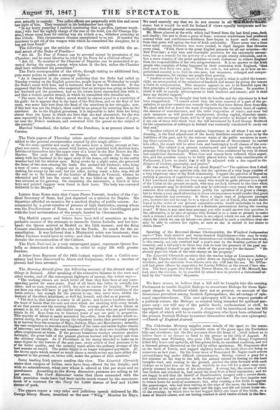The papers report a very calm and judicious speech delivered
by Mr. George Henry Moore, described as the new " Whig " Member for Mayo.
V"
We need scarcely say that we do not concur in all Itaxriat.V sions; but it would be well for Ireland if views equally temperate and in- telligent obtained general concurrence.
Mr. Moore glanced at the evils which had flowed from the last fatal year, dark and dewily; but saw in them a germ of hope: common misfortunes had produced mutual trust and confidence—lrishmen have begun to know each other; and from that germ will spring the tree of Irish nationality. There never was a time when unity among Irishmen was more needed, to repel dangers that threaten every class. "First, there is the great English panacea for all our miseries—the New Poor-law; a very wise and charitable provision for the extremely neceeei- tons, but as a remedy for the poverty of a whole people utterly ridiculous, and in fact a mere evasion of the great question—a mere endeavour to relieve England from the responsibilities other own misgovernment. It is no answer to the Irish people who complain of being beggared by their connexion with England, ' that they must feed their own poor.' What we seek is, not advice as to how an im- poverished country is to feed its own poor, but measures, enlarged and compre- hensive measures, for raising our people from poverty. "Another remedy for the wants of the Irish people is what is called the tenant- right, an arrangement of the relations of landlord and tenant by giving the tenant a claim to compensation. This measure appears to me to be founded upon the first principles of natural justice and the natural rights of labour. In practice, I think it will be equally advantageous to both landlord and tenant; and it shall have my decided support." As to emigration, he thought that both its benefits and the objections to it had been exaggerated. "I cannot admit that the mere removal of a part of the po- pulation to another country can remedy the evils that have driven them frointhis. We shall still feel at home the want of employment, the constant drain of capital, the absence of manufactures, and the utter stagnation of trade; and none but such measures as will promote employment, develop capital, stimulate manu- factures, and encourage trade, will be of any real service to Ireland or the Irish. I am one of those who think that the bill introduced by Lord George Bentinck for the construction of railways in Ireland was eminently calculated to carry out that end."
"Another subject of deep and anxious importance to all whom I am now ad- dressing, is the final adjustment of the heavy liabilities entailed upon us by the liabilities of the past, and by the ruinous waste of the public resources in meet- ing those calamities. Should the present intentions of Government be carried into effect, the result will be utter ruin and bankruptcy to all classes of the com- munity. The subject is at present embarrassed and mixed up with much un- pleasant feeling in the English mind, which has been embittered by very ill-timed and injudicious discussions. When time and reason have softened these aspen- ties, and the question comes to be fairly placed before the calm consideration of Parliament, I have no doubt that it will be adjusted with a due regard to the dictates of wisdom, generosity, and justice."
He was asked, "What do you say about Repeal?"—" The opinions that I shall state to you are not my opinions only, but the opinions of a very large number of a very important class of the Irish community. Iregard the question of Repeal AS entirely a question of expediency—as a question of time and circumstances; and I feel convinced that there are very many who would be quite adverse to a repeal of the Union at the present moment, who may yet look forward to the time when such a measure may be desirable and may be achieved—very many who may not conceive that existmg circumstances justify the agitation of so great a change, but to whom a very small alteration in those circumstances would render that great change desirable and necessary. Is there a single man of judgment amongst you, however devoted he may be to a repeal of the act of Union, who would desire repeal in the midst of our present calamities—who would undertake to tax the country for the necessary expenses of a domestic government during the ensuing
year? If there is any sane man amongst you who would answer this question in the affirmative, is he also of opinion that Ireland is in a state at present to make such a demand and enforce it? There is one object which we can all desire, one object for which we can all labour—to place Ireland in such a condition that she may be able to enforce her rights, as soon as she is united in her desire to obtain them."


























 Previous page
Previous page